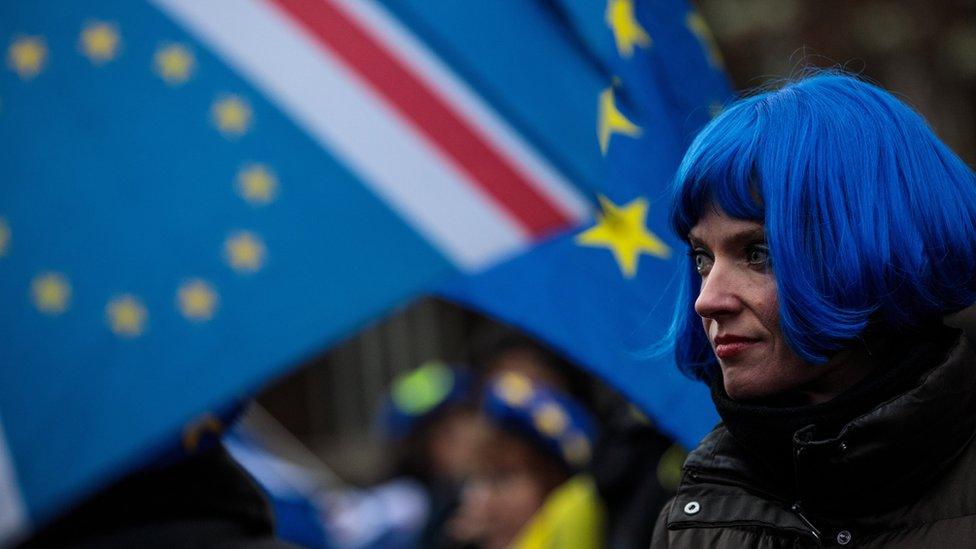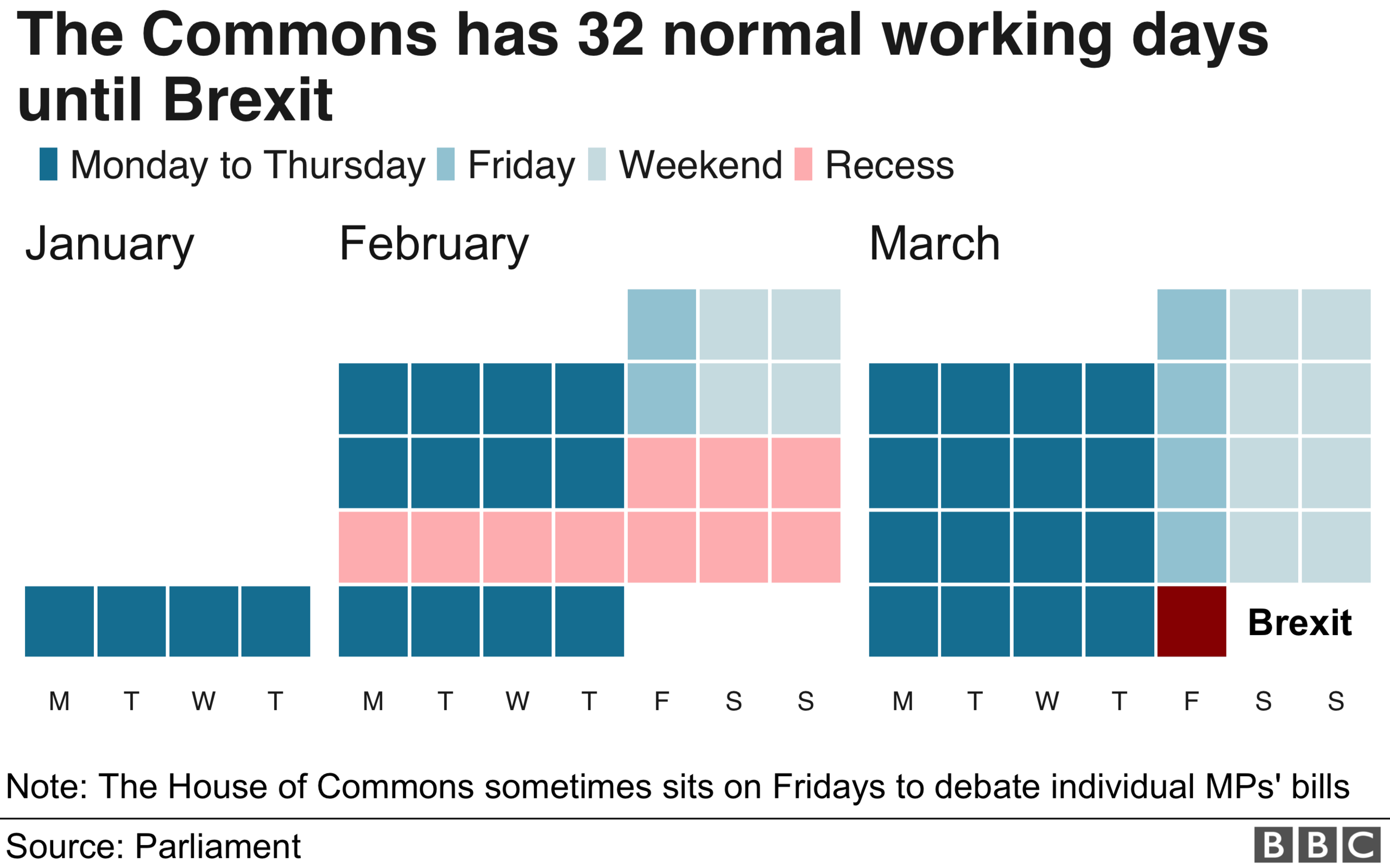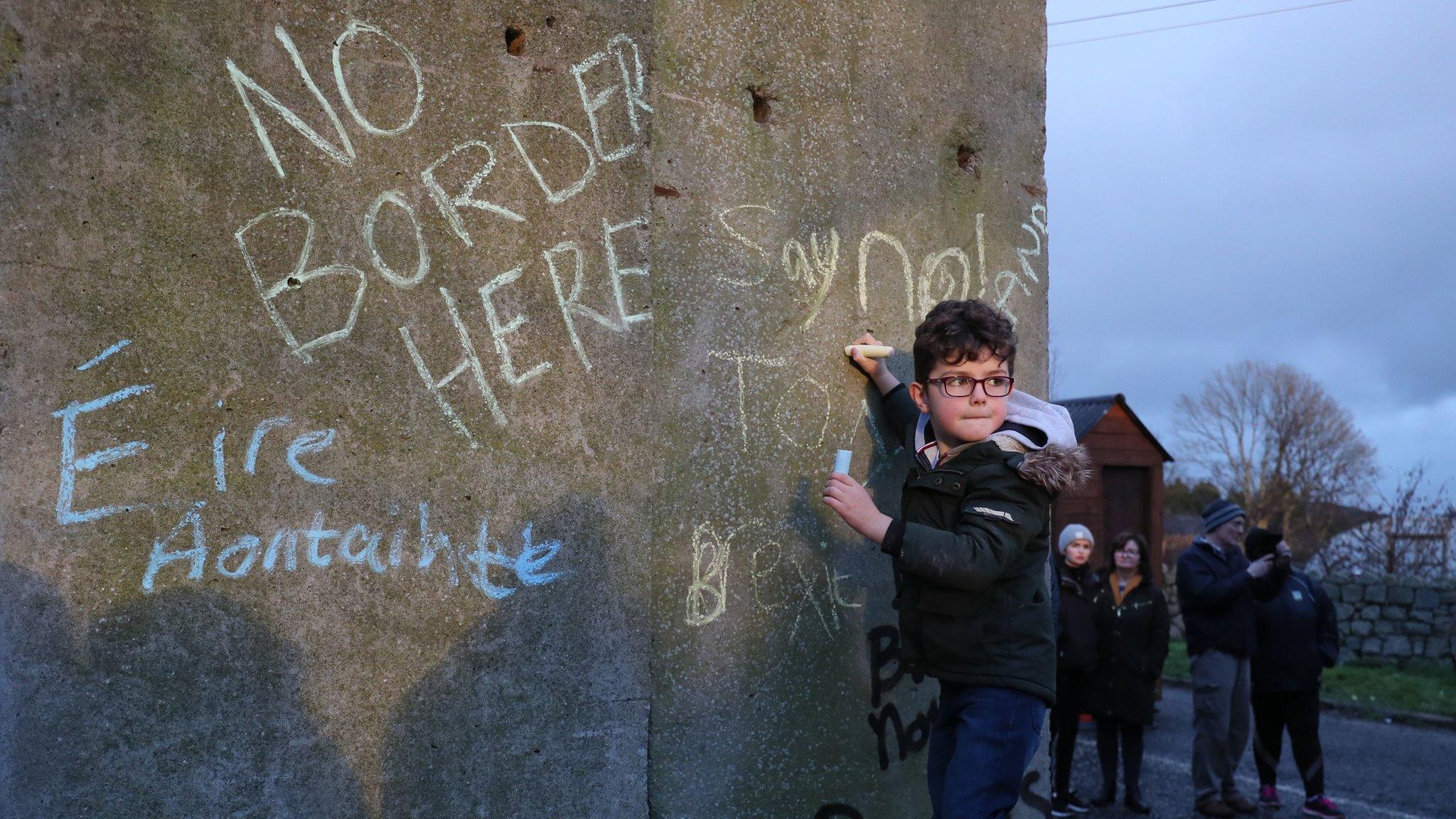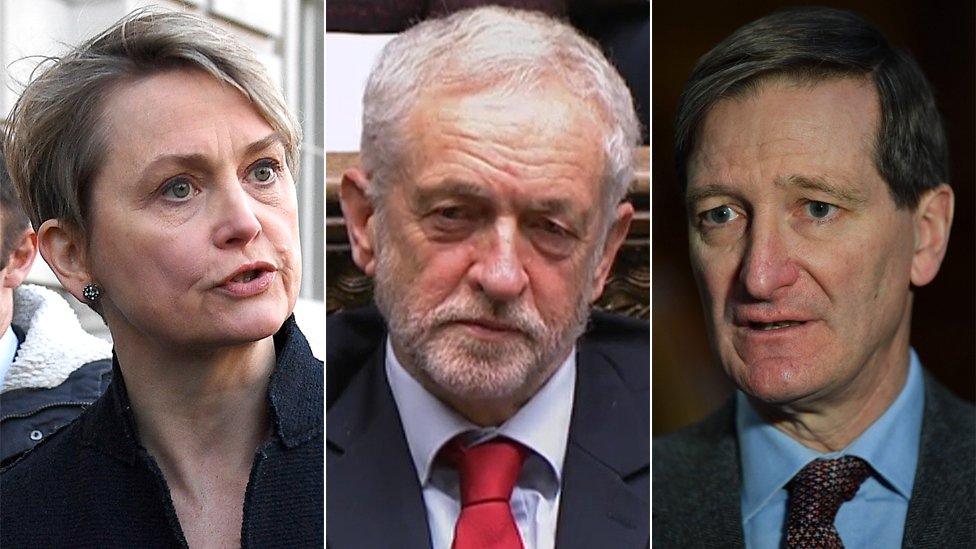Brexit: High risk of UK crashing out - EU negotiator
- Published
- comments
Sabine Weyand: Risk of a 'crash out' is high
There is a high risk of the UK crashing out of the EU without a deal by accident, the EU's deputy chief negotiator Sabine Weyand has said.
She said there was "full ownership of what was agreed" in the EU, but "no ownership" of it in the UK Parliament.
And it was a challenge to see how a majority for any deal could be built among MPs, she added.
The EU side were agreed that a time-limit to the Irish backstop defeated the purpose of having one, she added.
It comes as Theresa May addressed a meeting of Tory MPs, the day before all MPs vote on a series of amendments to the PM's plans that could shape the future direction of Brexit.
BBC's political correspondent Iain Watson said numerous sources at the meeting revealed the government would be whipping its MPs to vote for one amendment that proposes the backstop be replaced by "alternative arrangements".
The Irish backstop - the "insurance policy" in the withdrawal deal - has been the controversial sticking point. It is intended to ensure that whatever else happens, there will be no return to a visible border between Northern Ireland and the Irish Republic after the UK leaves the EU.
Both the UK and the EU believe that bringing back border checks could put the peace process at risk.
But the current wording of the backstop plan has proved unpopular with many Brexit-supporting Conservative MPs who are concerned that it could tie the UK to many EU rules indefinitely.
Speaking at an event in Brussels, Ms Weyand - deputy to the EU's chief negotiator Michel Barnier - said other options for the Irish border had been extensively discussed and referred to the months-long negotiations with her UK counterparts.
She said that a lot of the discussion of the withdrawal agreement in the UK was "uninhibited by any knowledge" of what it actually contained.
EU leaders were concerned about extending the two-year Article 50 process, she said, because Brexit was "eating up the political energy" for solving other issues.
She added that Mrs May's secrecy and reliance on a small group of people had been a "handicap" in getting support for the deal.
She said: "There is a very high risk of a crash-out, not by design, but by accident...
"The crash-out is the only scenario that does not require anyone to take any action or take any decisions."

'Truth bombs for Westminster'
By Adam Fleming, BBC Brussels correspondent

In Brussels, Sabine Weyand is known for her cheerful bluntness. Now the public have seen it too.
She lobbed a series of truth bombs at Westminster, saying MPs are criticising an agreement many of them haven't read and the cabinet's failure to "own" the deal is making it harder to approve.
And she contrasted her style of regular consultations with EU leaders and the European Parliament with Theresa May's reliance on a small circle of advisors - "a big handicap."
She will be accused in the UK of being undiplomatic, but many of her colleagues on the EU side of the negotiations feel equally fed up.
And maybe she was also trying to tell her ultimate bosses - EU leaders - that things are not looking good.

Meanwhile, Mrs May is being urged to secure changes from the EU to the Northern Irish backstop as part of her Brexit deal to get it past Parliament.
Ex-foreign secretary Boris Johnson says winning a "freedom clause" would be "unadulterated good Brexit news".
But the Irish deputy PM Simon Coveney says changes to the backstop - aimed at preventing a hard border - would not be acceptable.
The DUP's Brexit spokesman Sammy Wilson called on the government to "be tough" and "face down the stubbornness of Dublin and Brussels".
"It's time for the Irish to work constructively and advocate for a sensible trading arrangement with their biggest market in Great Britain," he said.


Is Parliament, finally, at long last, really on the verge of giving a clear signal about what it wants to do about Brexit?
As much as I can feel your pain, don't bet on it.
You've probably heard a lot of noise about the amendments that MPs will be voting on tomorrow night, not least from me. But there is no guarantee at all that any of them will pass.
First, some Tory MPs are coming round to the government's deal, if they can cut out the bit they don't like (yes, of course, the backstop.) A lot of them have signed up to a way of making that clear, by supporting Sir Graham Brady's amendment.
And if enough of them get on board it would allow the prime minister, in theory, to go back to the EU and say, tah dah! Look! I can get this deal through apart from this really pesky part, which might, as we've been reporting in the last few days, move things forward, despite the very strong warnings from Dublin that it can't happen.
But, I wouldn't bet very much that Brexiteers will switch to back it in a coherent and decisive way.

After Mrs May's deal was rejected in the Commons on 15 January by 432 votes to 202, opposition and backbench MPs have been tabling amendments to the plans.
While MPs will not deliver their final verdict on the deal on Tuesday, they will vote on the amendments and, if one is passed, show the PM what changes to the deal might be enough to get a modified version of the deal through Parliament.
The prime minister's official spokesman said it will be followed "as soon as possible" by a second meaningful vote on whatever deal has been secured with Brussels.
"The prime minister is absolutely committed to leaving the EU with a deal, but clearly if we are to obtain parliamentary support for that deal some changes are going to have to be made," the spokesman said.
One amendment that has the backing of senior Tory Sir Graham Brady, the chairman of the backbench 1922 Committee, calls for the backstop to be replaced by "alternative arrangements".
Speaking on BBC Radio 4's Today programme, Sir Graham said: "I'm hoping that the way in which the amendment is crafted, it can attract that very broad support. And if we can win the vote on my amendment I think it gives the prime minister enormous firepower."
He said the looming exit date is helping to "focus minds", adding: "I think we've already seen across the European Union a little bit more flexibility and a little creativity creeping in."
Brexiteers say if the non-binding amendment is passed it will give the PM more leeway to win concessions from the EU.
But the European Research Group, a group of Eurosceptic Tory MPs headed by Brexiteer Jacob Rees-Mogg, has said it would not back the amendment from Sir Graham on Tuesday.
Writing in the Daily Telegraph, Mr Johnson suggested, external Mrs May could get the EU to change the text of her agreement to include an expiry date for the backstop, or include a mechanism allowing the UK to unilaterally withdraw from it.
Mr Johnson said: "If the PM secures that change - a proper UK-sized perforation in the fabric of the backstop itself - I have no doubt that she will have the whole country full-throatedly behind her."
"If we leave without a deal we will be less safe... than remaining part of the EU" former head of the Security Service MI5 tells The World at One
One of the architects of the Good Friday Agreement, Lord Bew, told BBC Radio 4's Today programme that the backstop must be made "explicitly temporary and in legally binding terms" in order to avoid undermining the Agreement.
He said: "There is a conflict, the backstop advertises itself as defending the Good Friday Agreement in all its aspects.
"But you only have to look at what it says about agriculture… and you will see that you have a totally different top-down approach to dealing with matters of agriculture concern north and south to that in the Good Friday Agreement, where incidentally it's the very top item for co-operation."
Reiterating earlier comments that the EU would not ratify a deal without the backstop being included, the Irish Republic's deputy prime minister and foreign minister Simon Coveney said: "Even in a no-deal Brexit situation every party and every MP in the UK will have a responsibility to ensure there is no return to a hard border and Northern Ireland is protected."
He added: "The EU has been clear that the backstop is an integral part of the withdrawal agreement."
And European Commission spokesman Margaritis Schinas reiterated that the withdrawal agreement had been agreed with the UK government, was endorsed by EU leaders and was "not open for renegotiation".
Confused by Brexit jargon? Reality Check unpacks the basics.
The UK is due to leave the EU at 23:00 GMT on 29 March, and the prime minister has faced repeated calls to rule out the prospect of leaving without a deal if her agreement does not win approval.
It is also possible that MPs will back amendments on Tuesday which call on Mrs May to rule out no deal or to delay the UK's departure from the EU.
An amendment tabled by Labour MP Yvette Cooper and Conservative MP Nick Boles could extend Article 50 - which triggers the UK's withdrawal from the EU - by nine months, unless the prime minister can secure a deal by the end of February.

Appearing on the BBC's Andrew Marr Show on Sunday, Ms Cooper said she was not seeking to "block Brexit", adding that the bill would be amendable - meaning MPs could vote on how long any extension would be.
Mr Boles told the Today programme that Tuesday's vote would be "very, very close", adding: "We are going to need support from all sides of the house. Jeremy Corbyn has made some warm noises."
Mr Boles, who said he would support Sir Graham's amendment if it is selected, said MPs must "seize the moment" at the vote, as it offers "probably the only motion of its kind that's going to be amendable".
Meanwhile, a report from MPs on the Exiting the EU Committee, external says the government must rule out a no-deal Brexit.
Committee chairman Hilary Benn said: "The suggestion that the UK might opt for a no-deal outcome but assume that the EU will continue to act in a co-operative manner to avoid disruption, cannot seriously constitute the policy of any responsible government."
However, a Tory member of the committee, Craig Mackinlay, said he "disowned" the report findings as "just more Project Fear from a group of MPs who have never wanted the UK to leave the EU".
- Published27 January 2019

- Published29 January 2019

- Published30 July 2019
